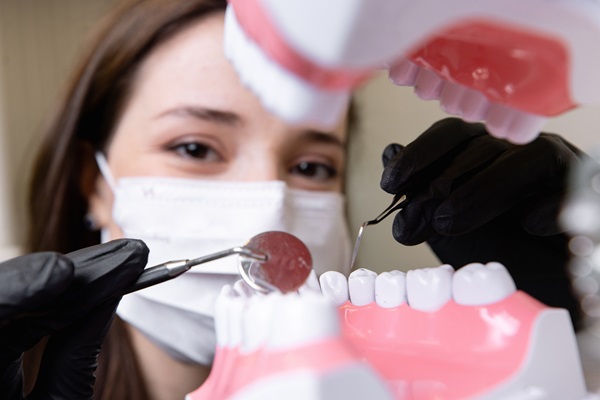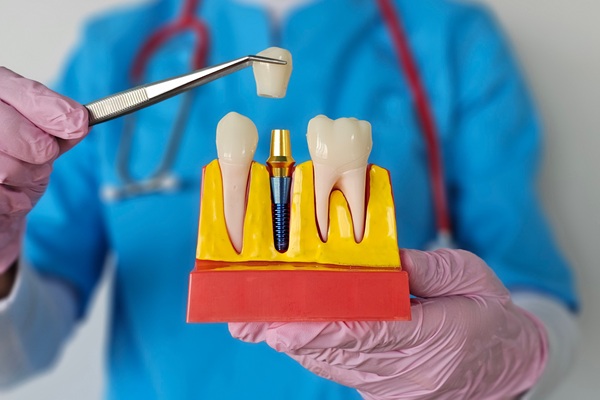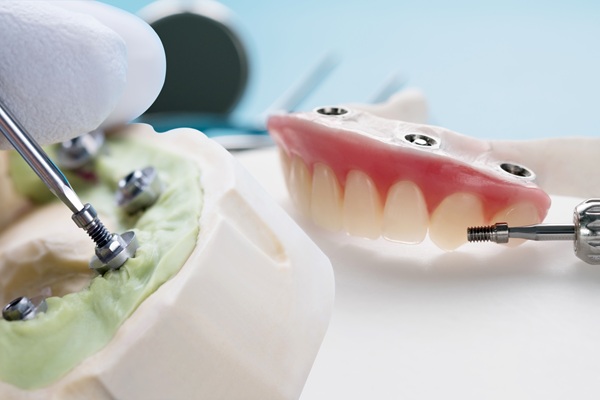The Most Common Types of Gum Disease

If you notice that your gums are bright red, swollen-looking, or bleed when you brush or floss, then you may have gum disease. This disease, also known as periodontal disease, is unfortunately quite common though, so you are not alone. It happens most often due to a build-up of bacteria on and around teeth thanks to improper brushing and flossing habits, so proper mouth cleaning techniques and routine trips to your dentist are a must.
The stages of periodontal disease
There are two major stages of gum disease. The early stage is called gingivitis, and the more advanced stage is known as periodontitis.
Gingivitis
This stage appears just after the initial bacterial infection occurs. Many people do not recognize right away that they have gingivitis. Often the process is too gradual at first and tough to notice as it generally does not cause any pain until later stages. Common indicators of gingivitis include:
- Halitosis or bad breath
- Gums that bleed more easily when brushed or flossed
- Red or purple colored gums
- Swollen or irritated gums
- Gums that are tender to the touch
Fortunately, gingivitis is usually reversible so if you think you have it, immediately begin a proper teeth cleansing regimen including an appropriate antibacterial mouthwash and swiftly schedule a visit to your dentist.
Periodontitis
If you do not catch that you have gingivitis, then it may advance and become periodontitis. Periodontitis causes more severe issues than gingivitis and normally requires a dentist to intervene. During this stage, the gums may begin to recede and pull away from the teeth, leaving open pockets for bacteria to gather and leading to further infection. Often, this further infection destroys the surrounding tissue and causes teeth to become loose. Sometimes this causes pain and even makes eating difficult because it becomes hard to chew correctly.
Fully advanced periodontitis may even eat away at the jaw bone and destroy so much of the bone and tissue holding your teeth in place that they fall out entirely. The good news is that most cases are still treatable. At its most severe stages, periodontitis requires antibiotic medication as well as extensive cleaning and repair work by your dentist. This work may include scaling and root planing, procedures through which dentists scrape your teeth and smooth the root surfaces to remove the plaque on, around, and under your teeth. Your dentist may also use implants to replace any teeth you lost, but only once your gums are healthy again. In a few extreme cases, surgical procedures including gum and bone grafts, pocket reduction surgery, and tissue regeneration may be necessary.
Conclusion
Gum disease is not something to mess around with. It not only harms your mouth, but it can expand to other parts of the body too, such as the heart, lungs, and brain. Periodontal disease may be linked to other health conditions like diabetes, heart disease, and stroke. Stay ahead of the spread by adequately brushing, flossing, and rinsing at least twice a day and seeing your dentist for regular check-ups and cleanings.
Request an appointment here: https://www.riversidefortworthdental.com or call Riverside Dental at (817) 210-4082 for an appointment in our Fort Worth office.
Check out what others are saying about our dental services on Yelp: Gum Disease in Fort Worth, TX.
Recent Posts
Gum disease treatment addresses the root source of the disease and halts the ramifications. Gum disease, or periodontal disease, is a common condition that damages the gums and the structures that support the teeth. If left untreated, it can cause serious problems, including tooth loss. The good news is that if caught early, these treatments…
Gum disease can become quite serious if it goes ignored; however, with the help of a family dentist, it can be caught early on so that treatment can be quickly started. Family dentists are general dentists that specialize in working with families, which includes both the parents and children. Because family dentists specialize in general…
Gum disease affects more than half of all adults in the United States, according to the International Journal of Health Sciences, and there are different forms of the condition. Gum disease is prevalent and one of the major causes of tooth loss. Therefore, it helps to understand the various stages of gum disease and its…
When it comes to oral health, the condition of the gums can be key. Proper brushing, flossing and the prevention of gingivitis can support good gum health; however, when individuals suffer from crooked teeth, an underbite or an overbite and choose to get braces, this may cause problems with the gingiva. Dental patients who want…


